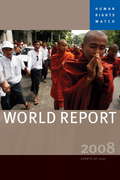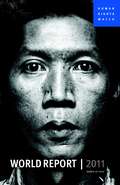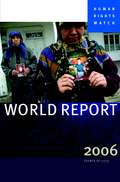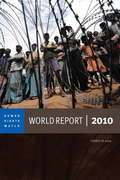Special Collections
Human Rights Collection
- Table View
- List View
Ituri
by Human Rights WatchIturi is often described as the bloodiest corner of the Democratic Republic of Congo (DRC). Despite three peace agreements purportedly ending the five year-old Congolese war, fighting in northeastern DRC intensified in late 2002 and early 2003. In early May 2003, hundreds of civilians were slaughtered in the town of Bunia and tens of thousands of others were forced to flee. Some sought shelter near the United Nations compound desperately looking for protection from the violence. While the international community focused on the town of Bunia, massacres continued in other parts of Ituri away from media attention. As one witness described it, "Ituri was covered in blood." Based on information gathered by its researchers and on other reports, Human Rights Watch estimates that at least 5,000 civilians died from direct violence in Ituri between July 2002 and March 2003. These victims are in addition to the 50,000 civilians that the United Nations estimates died there since 1999. These losses are just part of an estimated total of 3.3 million civilians dead throughout the Congo, a toll that makes this war more deadly to civilians than any other since World War II.
Divorced from Justice
by Human Rights WatchThe Egyptian government has created two widely disparate systems for divorce, one for men and one for women. Egyptian men have a unilateral and unconditional right to divorce. They never need to enter a courtroom to end their marriages. Egyptian women, on the other hand, must resort to Egypt's notoriously backlogged and inefficient courts to divorce their spouses. In the courts, women face procedural and evidentiary hurdles to divorce that are inherently discriminatory. Men, who can divorce their spouses at will with an oral renunciation later registered by a religious notary, can simply sidestep these procedures. Obtaining a divorce can also take years as men manipulate the many defenses and tactics Egyptian law reserves only for them. As a result, many Egyptian women, like Amira Ahmad, avoid the courts and are left with two equally distressing options: either remain in an unwanted marriage and possibly endure physical and psychological abuse, or beg their husbands to divorce them, giving up everything they own and cherish in return. The consequences of this two-tiered system are often financially and emotionally devastating for women. In some cases, they can be life-threatening.
The O'odua People's Congress
by Human Rights WatchNigeria has witnessed an increase in the activities of ethnic and regional militia, vigilantes, and other armed groups in the last few years. One of the better-known of these groups is the O'odua People's Congress (OPC), an organization active in the southwest of Nigeria which campaigns to protect the interests of the Yoruba ethnic group and seeks autonomy for the Yoruba people. The OPC is a complex organization, which has taken on several different roles as it has adapted to the changing political and security environment in Nigeria. One of several Yoruba self-determination groups, it was established in 1994 with the aim of overcoming what it alleged was the political marginalization of the Yoruba. It has since evolved in several different directions. Its activities have ranged from political agitation for Yoruba autonomy and promotion of Yoruba culture to violent confrontation with members of other ethnic groups, and, more recently, vigilantism and crime-fighting. In its two main spheres of activity-ethnic militancy and vigilantism-the OPC has been responsible for numerous human rights abuses and acts of violence, and its members have killed or injured hundreds of unarmed civilians. However, OPC members have been victims as well as perpetrators of human rights abuses. Hundreds of real or suspected OPC members have been killed by the police; many others have been arbitrarily arrested, tortured, and detained without trial for extended periods.
Forgotten Fighters
by Human Rights WatchAn agreement reached between government armed forces and the largest opposition group, the National Union for the Total Independence of Angola (União Nacional para a Independência Total de Angola, UNITA), brought peace to mainland Angola in April 2002. Some 100,000 adult combatants from UNITA moved with their families into quartering areas. Five thousand of these were integrated into the national police and armed forces; the rest into a formal demobilization program. Most adult fighters eighteen and older received demobilization and photo identification cards, a travel authorization certificate, a five-month salary based on military rank, and food assistance. They are also to receive a transport allowance and a reinstallation kit upon return to their home communities. But boy and girl soldiers, seventeen and younger, were not included in the demobilization program and received only an identification card and food aid distributed by the international community to family units attached to the soldiers.
Presumption of Guilt
by Human Rights WatchA report on abuses that occurred after September 11, 2001.
Rhetoric and Risk
by Human Rights WatchThis report documents how draconian drug laws and routine police abuse of injection drug users - the population hardest hit by HIV/AIDS in Ukraine - keep them from receiving lifesaving HIV information and services that the government has pledged to provide.
World Report 2006
by Human Rights WatchHuman Rights Watch is increasingly recognized as the world's leader in building a stronger awareness for human rights. Their annual World Report is the most probing review of human rights developments available anywhere. Written in straightforward, non-technical language, Human Rights Watch World Report prioritizes events in the most affected countries during the previous year. The backbone of the report consists of a series of concise overviews of the most pressing human rights issues in countries from Afghanistan to Zimbabwe, with particular focus on the role--positive or negative--played in each country by key domestic and international figures. Highly anticipated and widely publicized by the U.S. and international press every year, the World Report is an invaluable resource for journalists, diplomats, and all citizens of the world.
Discrimination, Denial, and Deportation
by Human Rights WatchThis 22-page report describes how discrimination and human rights abuses faced by migrant populations result in increased vulnerability to HIV infection and barriers to care and treatment.
Injecting Reason
by Human Rights WatchGovernment interference with sterile syringe programs is thwarting HIV prevention efforts in California. State laws and local enforcement are preventing drug users from obtaining the sterile syringes they need to protect themselves from HIV. This 61-page report documents police stopping, arresting, and harassing participants in needle exchange programs established by some California counties under state law. Even where needle exchange programs are legal, police remain authorized to arrest program participants under an antiquated law prohibiting the possession of "drug paraphernalia." Over a quarter of new AIDS cases in the United States can be traced to infected syringes. Sharing syringes is also a major risk factor in the spread of hepatitis B and C. California is home to nearly one eighth of reported AIDS cases in the United States. The Human Rights Watch report recommends legalization of needle exchange programs and nonprescription pharmacy sales of syringes. It also calls on police departments to cease stops and seizures of participants in clean needle programs, a practice courts have recently prohibited in Connecticut, Massachusetts and New York.
Witness to Abuse
by Human Rights WatchThe 101-page report, documents how the Justice Department denied the witnesses fundamental due process safeguards. Many were not informed of the reason for their arrest, allowed immediate access to a lawyer, nor permitted to see the evidence used against them. The Justice Department evaded fundamental protections for the suspects and the legal requirements for arrested witnesses. Their court proceedings were conducted behind closed doors, and all the court documents were sealed.
No Bright Future
by Human Rights WatchThis 72-page report documents how the abusive policies and practices of the Zimbabwean government are fueling the HIV/AIDS epidemic, increasing vulnerability to infection, and obstructing access to treatment.
Fanning the Flames:How Human Rights Abuses are Fueling the AIDS Epidemic in Kazakhstan
by Human Rights WatchHuman rights abuse against injection drug users and sex workers in Kazakhstan is fueling one of the fastest growing AIDS epidemics in the world, Human Rights Watch said in this new report.The 54-page report, "Fanning the Flames: How Human Rights Abuses are Fueling the AIDS Epidemic in Kazakhstan," documents instances of violent police brutality, lack of due process, harassment and stigmatization that drive drug users and sex workers underground and impede their access to life-saving HIV prevention services.Routine and sometimes violent harassment of injection drug users and sex workers by the police adds to their already marginal status in Kazakhstan. Drug users may be arrested for possession of very tiny amounts of narcotics, police find it easy to pin false charges on them, and they are convenient targets when arrest quotas need to be filled.
“We are Not the Enemy”
by Human Rights WatchPublic officials tried vigorously to contain a wave of hate crimes in the United States after September 11, Human Rights Watch said in a report released today. Nevertheless, anti-Muslim hate crimes in the United States rose 1700 percent during 2001. The report documents anti-Arab and anti-Muslim violence and the local, state and federal response to it. The forty-one page report, “We Are Not the Enemy,” draws on research with police, prosecutors, community activists, and victims of hate crimes in six cities (Seattle, Washington; Dearborn, Michigan; Chicago, Illinois; Los Angeles, California; Phoenix, Arizona; and New York, New York) to review steps taken by government officials to prevent and prosecute hate crimes after the September 11 attacks in New York and Washington, D.C. The report also examines the scope and extent of these hate crimes, which included murder, assault, arson, and vandalism. “Government officials didn’t sit on their hands while Muslims and Arabs were attacked after September 11,” said Amardeep Singh, author of the report and U.S. Program researcher at Human Rights Watch. “But law enforcement and other government agencies should have been better prepared for this kind of onslaught.”
Lessons Not Learned
by Human Rights WatchThis 62-page report documents how harsh drug policies and routine police harassment of injection drug users--the population hit hardest by AIDS in Russia--impedes their access or makes them afraid to seek basic HIV-prevention services such as syringe exchange, which is available in other countries around the world. Now that AIDS is rapidly spreading into the general population, these misguided policies have widespread consequences.
Rehabilitation Required
by Human Rights WatchIn this 110-page study, Human Rights Watch found that the treatment offered at state drug treatment clinics in Russia was so poor as to constitute a violation of the right to health. The report concluded that drug dependent people in Russia who want to overcome their dependence are left virtually to their own devices in their battle with this serious and chronic disease.
“Please, do not make us suffer any more…”
by Human Rights WatchIn this 47-page report Human Rights Watch said that countries could significantly improve access to pain medications by addressing the causes of their poor availability. These often include the failure to put in place functioning supply and distribution systems; absence of government policies to ensure their availability; insufficient instruction for healthcare workers; excessively strict drug-control regulations; and fear of legal sanctions among healthcare workers.
Locked Doors
by Human Rights WatchWidespread discrimination against people with HIV/AIDS is fueling the spread of the epidemic in China. This 94-page report is based on more than 30 interviews with people with HIV/AIDS, police officers, drug users, and AIDS outreach workers in Beijing, Hong Kong, and Yunnan province. Many people living with HIV/AIDS have no access to health care because hospitals refuse to treat them. Human Rights Watch found that at one hospital, the door to the AIDS clinic was actually padlocked. National laws discriminate against people with HIV/AIDS, and some local laws ban them from using swimming pools or working in food service. The police send drug users to detoxification centers, where they are forced to labor without pay to make trinkets for tourists. Instead of receiving help for their problem, they are driven underground, making it harder for the government to combat the AIDS virus.
World Report 2011
by Human Rights WatchHuman Rights Watch is increasingly recognized as the world's leader in building a stronger awareness for human rights. Their annual World Report is the most probing review of human rights developments available anywhere. Written in straightforward, non-technical language, Human Rights Watch World Report prioritizes events in the most affected countries during the previous year. The backbone of the report consists of a series of concise overviews of the most pressing human rights issues in countries from Afghanistan to Zimbabwe, with particular focus on the role--positive or negative--played in each country by key domestic and international figures. Highly anticipated and widely publicized by the U.S. and international press every year, the World Report is an invaluable resource for journalists, diplomats, and all citizens of the world.
Custody and Control
by Human Rights WatchThis 136-page report provides an in-depth look at the abuses and neglect suffered by girls confined in two remote New York State juvenile facilities known as Tryon and Lansing. The facilities are operated by the New York Office of Children and Family Services (OCFS) and are the only two higher-security facilities in New York State holding girls.
Ill-Equipped
by Human Rights Watch StaffMentally ill offenders face mistreatment and neglect in many U.S. prisons. One in six U.S. prisoners is mentally ill. Many of them suffer from serious illnesses such as schizophrenia, bipolar disorder, and major depression. There are three times as many men and women with mental illness in U.S. prisons as in mental health hospitals. The rate of mental illness in the prison population is three times higher than in the general population. This 215-page report examines how prisons are dangerous and damaging places for mentally ill people. Other prisoners victimize and exploit them. Prison staff often punish mentally ill offenders for symptoms of their illness - such as being noisy or refusing orders, or even self-mutilation and attempted suicide. Mentally ill prisoners are more likely than others to end up housed in especially harsh conditions, such as isolation, that can push them over the edge into acute psychosis. Woefully deficient mental health services in many prisons leave prisoners undertreated - or not treated at all. Across the country, prisoners cannot get appropriate care because of a shortage of qualified staff, lack of facilities, and prison rules that interfere with treatment. The report is based on more than two years of research and hundreds of interviews with prisoners, corrections officials, mental health experts and attorneys and makes recommendations on services and regulations that would assist and protect mentally ill prisoners.
Ignorance Only
by Human Rights WatchPrograms teaching teenagers to "just say no" to sex before marriage are threatening adolescent health by censoring basic information about how to prevent HIV/AIDS, Human Rights Watch charged in a new report released today. The forty-seven page report focuses on federally funded "abstinence-only-until-marriage" programs in Texas, where advertising campaigns convey the message that teenagers should not use condoms because they don't work. Some school-based programs in Texas do not mention condoms at all. Federal health agencies share the broad scientific consensus that condoms, when used correctly, are highly effective in preventing the transmission of HIV. Yet the U.S. government currently spends more than $ 100 million each year on "abstinence-only-until-marriage" programs, which cannot by law "promote or endorse" condoms or provide instruction regarding their use. The Bush administration is advocating a 33 percent increase in funding for these programs.
Policy Paralysis
by Human Rights WatchThis 90-page report documents human rights abuses that women and girls suffer at each stage of their lives and that increase their risk for HIV infection. Girls face sexual abuse and violence, in and out of school. Women in long-term relationships risk violence if they insist on condom use or refuse sex. Widows are discriminated against in property and inheritance rights. And women and girls are raped in war and civil conflict, where rape is used strategically as a weapon.
World Report 2007
by Human Rights WatchHuman Rights Watch is increasingly recognized as the world's leader in building a stronger awareness for human rights. Their annual World Report is the most probing review of human rights developments available anywhere. Written in straightforward, non-technical language, Human Rights Watch World Report prioritizes events in the most affected countries during the previous year. The backbone of the report consists of a series of concise overviews of the most pressing human rights issues in countries from Afghanistan to Zimbabwe, with particular focus on the role--positive or negative--played in each country by key domestic and international figures. Highly anticipated and widely publicized by the U.S. and international press every year, the World Report is an invaluable resource for journalists, diplomats, and all citizens of the world.
Forced Apart
by Human Rights WatchThis 88-page report is the first comprehensive assessment of the deportation of non-citizens with criminal convictions and the impact on families and communities in the US. The mandatory deportation of legal immigrants convicted of a crime, even a minor one, has separated an estimated 1.6 million children and adults, including US citizens and lawful permanent residents, from their non-citizen family members. Many of those deported arrived in the US as children and were lawful permanent residents who had lived legally in the country for decades.
World Report 2009
by Human Rights WatchHuman Rights Watch is increasingly recognized as the world's leader in building a stronger awareness for human rights. Their annual World Report is the most probing review of human rights developments available anywhere. Written in straightforward, non-technical language, Human Rights Watch World Report prioritizes events in the most affected countries during the previous year. The backbone of the report consists of a series of concise overviews of the most pressing human rights issues in countries from Afghanistan to Zimbabwe, with particular focus on the role--positive or negative--played in each country by key domestic and international figures. Highly anticipated and widely publicized by the U.S. and international press every year, the World Report is an invaluable resource for journalists, diplomats, and all citizens of the world.




